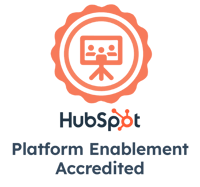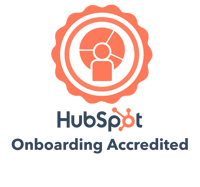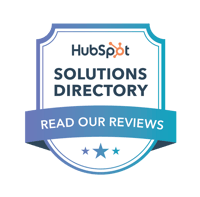Many manufacturing companies struggle with digital marketing. It's difficult to draw in business when you're not selling a product someone can buy directly from your website and when your sales process is long. Additionally, it can be hard to stand out among the crowd when all your competitors are doing the same thing.
For manufacturers, inbound marketing provides a unique opportunity to capture leads. Unlike marketing a tangible product, inbound marketing is about positioning your company as a thought leader and providing free value to your customers. This builds trust, authority, and respect.
What is Inbound Marketing?
Inbound marketing is customer-oriented and customer-driven. Simply put, inbound marketing starts with valuable content that your target audience wants, instead of just advertising your services. In a traditional marketing model, you would simply “spread the word” about your business through print or online ads. With inbound marketing, you instead focus on providing valuable information or items your customers can use. For example, you might start with an ebook, a quiz, a checklist or a blog that your ideal customer might find useful. You dangle that content offer to get nibbles in exchange for a form fill or phone call, and then follow-up with more direct advertising. Additionally, inbound marketing is also focused on keeping buyers perpetually in motion with your brand, even after a purchase.
The key takeaway is that inbound marketing is customer-centered. They find you, you don’t find them.
The inbound methodology
Inbound marketing follows a methodology of three primary stages. Each stage represents a different point in your customers’ journeys. HubSpot defines the stages of the inbound methodology as:
- Attract: drawing in the right people with valuable content and conversations that establish you as a trusted advisor with whom they want to engage.
- Engage: presenting insights and solutions that align with their pain points and goals so they are more likely to buy from you.
- Delight: providing help and support to empower your customers to find success with their purchase.
These stages are cyclical – even after a customer makes a purchase, you can still draw them back for more with relevant content. This creates a never-ending flywheel that’s perpetually in motion.
Inbound Marketing Assets for Manufacturers
The core of inbound marketing is the valuable content (or assets) you provide for your audience that draws them to your website.
Before creating assets, answer these questions to help determine what content your audience is interested in:
- Who are your buyers personas? Which will be the focus of your inbound campaign? Personas are semi-fictional representations of your audience. Knowing specifically who you want to target makes it easier to know what kind of content will resonate with them.
- What are your chosen persona's pain points? Think about what drives them to work with you initially. These sorts of pain points could spiral into topics themselves.
- What questions do you hear the most often from this persona? Knowing what questions your audience is asking positions you to answer them with your content.
- Are there any recent developments/news in your industry that's relevant to this persona? Are there new standards rolling out? Is a certain technology top of mind? Speaking on new developments as an industry authority is compelling to your potential customers.
Types of assets
Once you've got your topic in mind, it's time to create the actual marketing asset. These include:
- eBooks: Take a look back at some blogs you’ve done – a simple eBook idea is to take a few blogs you’ve written on the same topic and compile them into one larger eBook. Example: The Complete Guide to Metal Fabrication for Aerospace Defense
- Quizzes: You can create targeted quizzes related to your industry and gate the results – simply have people enter their email before they can see their results. Quizzes are unique content offerings in that they’re interactive and allow you to mine more information about your leads before you meet with them. Example: Which Void-Fill is Right for Your Shipment?
- Gated Videos: Try creating a webinar about a topic that you’re knowledgeable about (or even have a roundtable discussion with other thought leaders in your industry). You can then work this into an inbound marketing campaign by gating the video – requiring visitors to fill out a form or RSVP online before they are given access to the video. Example Topic: Addressing New Challenges for Automative Manufacturing in 2021
- Templates/Worksheets: Templates or worksheets are a fantastic way to deliver content to your audience that they can use. Best of all, these content pieces will be used again and again. Example: Downloadable Shipping Cost Calculator
- Checklists: A checklist can help someone new to a process or concept navigate through it with ease. Checklists are also very simple to create as they’re typically only a few pages in length. Example: Are You Ready for Industry 4.0?
Inbound marketing is a tactic that manufacturers can use to effectively market their business. Unlike a traditional digital marketing model, inbound marketing is suited for long sales cycles that require a foundation of trust. By providing valuable content your audience wants, you can keep them coming back to your site and position yourself in their minds as an expert they should do business with.
Free Download: Everything You Ever Wanted to Know About Inbound Campaigns
Content is critical, and the best way to create compelling content is by providing value. Inbound campaigns help you find, target, and convert your ideal audience. Click "get my eBook" below to learn how to create buzz-worthy Inbound campaigns that drive action.
BizzyWeb is a Minneapolis-based digital marketing and web design agency that helps companies get the high-quality leads they need to grow and thrive. Our tactics include inbound marketing, SEO, advertising, web design, content creation and sales automation. We are an accredited HubSpot Platinum Partner and we offer full-service HubSpot onboarding, enablement and strategy for new and current users.






